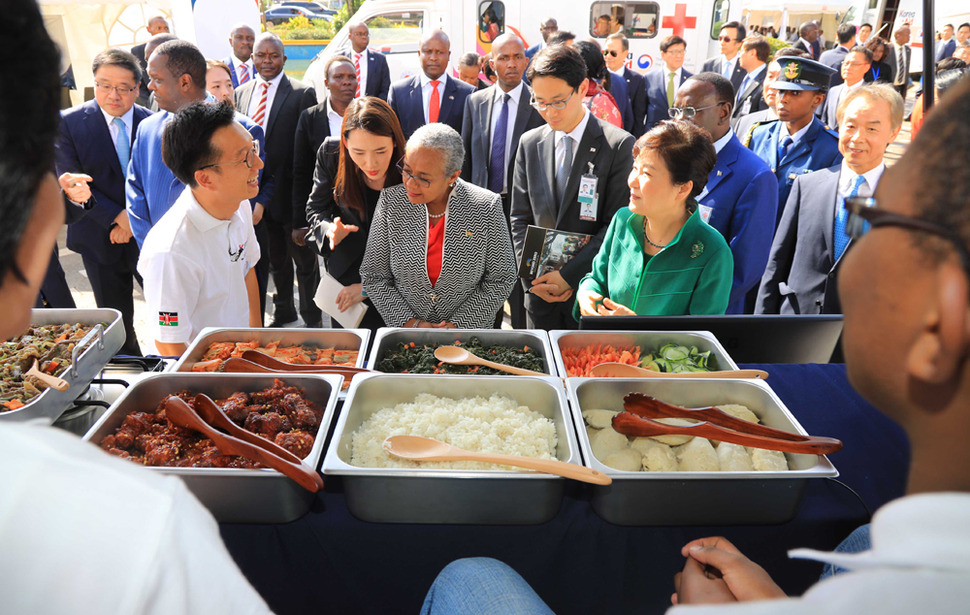 |
|
President Park Geun-hye and Kenyan first lady Margaret Kenyatta talk to the cooks at a Korea Aid test event in Nairobi, May 31. (Yonhap News)
|
Aid groups voice criticism of government’s new overseas aid plan(Hankyoreh)
#Korea_Aid #Park_Guen_hye #ODA_Watch
New model for developmental aid for Africa is a food truck filled with Bibimbab?????? Seriously?
The Korea Aid program, heavily publicized by the government as a “new South Korean model of official development assistance (ODA)” with President Park Geun-hye’s recent Africa visit, is running into fierce objections from groups involved in international development assistance efforts.While Seoul has cited the project as one of the top three results of Park’s visit, the groups are calling for an immediate end to what they have called “a mere show to promote South Korea rather than real aid.”An investigation by the Hankyoreh on June 3 showed that Korea Aid was not included in the administration’s general implementation plan for 2016-17 international development assistance as recently as May. Many critics are now saying the project was instead clapped together in time for Park’s tour.The basis for the Korea Aid program was reported to be an idea that Park herself presented earlier this year.A joint press release on May 25 by the Ministry of Foreign Affairs (MOFA), the Ministry of Culture, Sports, and Tourism (MCST), the Ministry of Agriculture, Food, and Rural Affairs (MAFRA), and the Ministry of Health and Welfare (MOHW) promoted Korea Aid as a “mobile development assistance project using vehicles for public health, food, and culture” as part of an effort to “increase development assistance in Africa, which has many of [the world’s] poorest countries and poorest populations.”The administration described Korea Aid as a “new South Korean development assistance model” combining development assistance with public health, food, and culture elements included alongside visiting services.Seoul previously attempted a test run of Korea Aid in which ten vehicles were sent to each of the three countries visited by Park: Ethiopia, Uganda, and Kenya. The vehicles included three related to public health (one check-up vehicle and two ambulances), four for food (three food trucks and one refrigerated truck), one video truck for culture, and two support vehicles. Food primarily consisted of bibimbap(mixed rice and vegetables) and other rice dishes, while videos for the 2018 Pyeongchang Winter Olympics, K-Pop, and breakdancing were shown by culture vehicles and fetal imaging and health kits were provided for public health.At a special talk before the African Union on May 27, Park described Korea Aid as “a new model of development assistance that allows us to connect and communicate with Africa’s people through our hearts.” She also visited to observe the project’s first implementation on the ground in the three countries. The administration said it plans to have a test run once a month until the second half of 2017, when all vehicles are to be provided to the three countries.But civic groups attacked what they called as “embarrassing one-time event and a disgrace to South Korean aid that ignores the purpose of aid and international terms.” The project was also called a “step backward in the history of South Korea’s international development assistance.” The group People’s Solidarity for Participatory Democracy (PSPD) demanded an “immediate end,” while ODA Watch called for the project’s “full-scale reconsideration.” Critics raised a number of questions about Korea Aid’s components, including how providing meals once a month could lower death rates, what use a single ambulance is likely to be, and why development assistance money rather than the government’s promotional budget is being used to promote the Pyeongchang Olympics and K-Pop.Two particular problems were singled out. First is the clear step backward from South Korea’s previous efforts to set up an organized development assistance system following international norms on aid since its 2010 joining of the OECD’s Development Assistance Committee (DAC) marked its transformation from aid recipient to aid donor. The OECD’s basic principles on international development assistance are laid out in its 2005 Paris Declaration on Aid Effectiveness, which states that mutual accountability and transparency between aid donors and recipients are necessary for the success of cooperation. According to the declaration, aid should be based on the recipient country’s development strategy and be designed to promote its policy initiative and ownership, with transparency a necessary element to ensure and strengthen public support.On that basis, South Korea and other countries and groups involved in aid have strived to improve the principles behind their activities to go beyond “events” and hardware-centered efforts such as building construction and item donations to focus on bolstering “software” within the recipient country’s systems and personnel capabilities.A second criticism is that the Korea Aid “event” was slapped together without undergoing systematic examination. During a confirmation of the 2017 implementation plan for international development assistance at the 26th meeting of the International Development Assistance Committee on May 30, Prime Minister Hwang Kyo-ahn said plans had been established to “effectively bolster Korea Aid and other major projects.”But Korea Aid was not included on an agenda circulated to the committee’s non-government members in early May.
